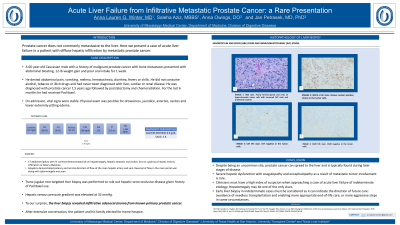Tuesday Poster Session
Category: Liver
P4015 - Acute Liver Failure From Infiltrative Metastatic Prostate Cancer: A Rare Presentation
Tuesday, October 24, 2023
10:30 AM - 4:00 PM PT
Location: Exhibit Hall


Anna Lauren G. Winter, MD
University of Mississippi Medical Center
Jackson, MS
Presenting Author(s)
Saleha Aziz, MD1, Anna Lauren G. Winter, MD1, Anna Owings, DO1, Jan Petrasek, MD, PhD2
1University of Mississippi Medical Center, Jackson, MS; 2UT Health San Antonio, Texas Liver Institute, Jackson, MS
Introduction: Prostate cancer does not commonly metastasize to the liver. Here we present a case of acute liver failure in a patient with diffuse hepatic infiltration by metastatic prostate cancer.
Case Description/Methods: A 66-year-old Caucasian male with a history of malignant prostate cancer with bone metastases presented with abdominal bloating, 12-lb weight gain and poor oral intake for 1 week. He denied abdominal pain, vomiting, melena, hematochezia, diarrhea, fevers or chills. He did not consume alcohol, tobacco or illicit drugs and had never been diagnosed with liver, cardiac or renal disease. He was diagnosed with prostate cancer 1.5 years ago followed by prostatectomy and chemoradiation. For the last 6 months he had received Paclitaxel. On admission, vital signs were stable. Physical exam was positive for drowsiness, jaundice, asterixis, ascites and lower extremity pitting edema. Labs were significant for creatinine 1.45 mg/dL, AST 200 U/L, ALT 86 U/L, ALP 326 U/L, total bilirubin 2.08 mg/dL, direct bilirubin 1.46 mg/dL, INR 2.01, PT 23.2 sec and PSA 1,420 ng/dL. CT abdomen/pelvis with IV contrast demonstrated 18 cm hepatomegaly, hepatic steatosis and ascites, but no suspicious hepatic lesions, infiltration or biliary dilatation. Dopplers demonstrated patency and normal direction of flow of the main hepatic artery and vein. Reversal of flow in the main portal vein along with splenomegaly was seen. Diagnostic paracentesis showed ascites protein 0.9 g/dL and SAAG 2.8. Trans-jugular non-targeted liver biopsy was performed to rule out hepatic veno-occlusive disease given history of Paclitaxel use. Hepatic venous pressure gradient was elevated at 32 mmHg. To our surprise, the liver biopsy revealed infiltrative adenocarcinoma from known primary prostate cancer. After extensive conversation, the patient and his family elected for home hospice.
Discussion: Despite being an uncommon site, prostate cancer can spread to the liver and is typically found during later stages of disease. Severe hepatic dysfunction with coagulopathy and encephalopathy as a result of metastatic tumor involvement is rare. Clinicians must have a high index of suspicion when approaching a case of acute liver failure of indeterminate etiology. Hepatomegaly may be one of the only clues. Early liver biopsy in indeterminate cases must be considered as it can indicate the direction of future care: avoidance of needless transplantation and enabling more appropriate end-of-life care, or more aggressive steps in some circumstances.
Disclosures:
Saleha Aziz, MD1, Anna Lauren G. Winter, MD1, Anna Owings, DO1, Jan Petrasek, MD, PhD2. P4015 - Acute Liver Failure From Infiltrative Metastatic Prostate Cancer: A Rare Presentation, ACG 2023 Annual Scientific Meeting Abstracts. Vancouver, BC, Canada: American College of Gastroenterology.
1University of Mississippi Medical Center, Jackson, MS; 2UT Health San Antonio, Texas Liver Institute, Jackson, MS
Introduction: Prostate cancer does not commonly metastasize to the liver. Here we present a case of acute liver failure in a patient with diffuse hepatic infiltration by metastatic prostate cancer.
Case Description/Methods: A 66-year-old Caucasian male with a history of malignant prostate cancer with bone metastases presented with abdominal bloating, 12-lb weight gain and poor oral intake for 1 week. He denied abdominal pain, vomiting, melena, hematochezia, diarrhea, fevers or chills. He did not consume alcohol, tobacco or illicit drugs and had never been diagnosed with liver, cardiac or renal disease. He was diagnosed with prostate cancer 1.5 years ago followed by prostatectomy and chemoradiation. For the last 6 months he had received Paclitaxel. On admission, vital signs were stable. Physical exam was positive for drowsiness, jaundice, asterixis, ascites and lower extremity pitting edema. Labs were significant for creatinine 1.45 mg/dL, AST 200 U/L, ALT 86 U/L, ALP 326 U/L, total bilirubin 2.08 mg/dL, direct bilirubin 1.46 mg/dL, INR 2.01, PT 23.2 sec and PSA 1,420 ng/dL. CT abdomen/pelvis with IV contrast demonstrated 18 cm hepatomegaly, hepatic steatosis and ascites, but no suspicious hepatic lesions, infiltration or biliary dilatation. Dopplers demonstrated patency and normal direction of flow of the main hepatic artery and vein. Reversal of flow in the main portal vein along with splenomegaly was seen. Diagnostic paracentesis showed ascites protein 0.9 g/dL and SAAG 2.8. Trans-jugular non-targeted liver biopsy was performed to rule out hepatic veno-occlusive disease given history of Paclitaxel use. Hepatic venous pressure gradient was elevated at 32 mmHg. To our surprise, the liver biopsy revealed infiltrative adenocarcinoma from known primary prostate cancer. After extensive conversation, the patient and his family elected for home hospice.
Discussion: Despite being an uncommon site, prostate cancer can spread to the liver and is typically found during later stages of disease. Severe hepatic dysfunction with coagulopathy and encephalopathy as a result of metastatic tumor involvement is rare. Clinicians must have a high index of suspicion when approaching a case of acute liver failure of indeterminate etiology. Hepatomegaly may be one of the only clues. Early liver biopsy in indeterminate cases must be considered as it can indicate the direction of future care: avoidance of needless transplantation and enabling more appropriate end-of-life care, or more aggressive steps in some circumstances.
Disclosures:
Saleha Aziz indicated no relevant financial relationships.
Anna Lauren Winter indicated no relevant financial relationships.
Anna Owings indicated no relevant financial relationships.
Jan Petrasek indicated no relevant financial relationships.
Saleha Aziz, MD1, Anna Lauren G. Winter, MD1, Anna Owings, DO1, Jan Petrasek, MD, PhD2. P4015 - Acute Liver Failure From Infiltrative Metastatic Prostate Cancer: A Rare Presentation, ACG 2023 Annual Scientific Meeting Abstracts. Vancouver, BC, Canada: American College of Gastroenterology.
